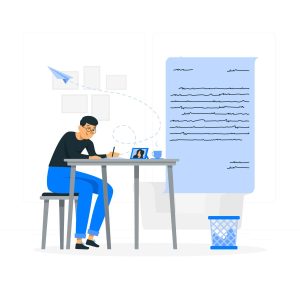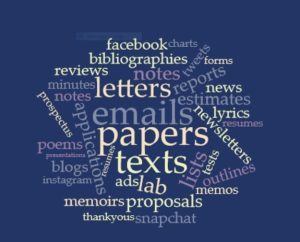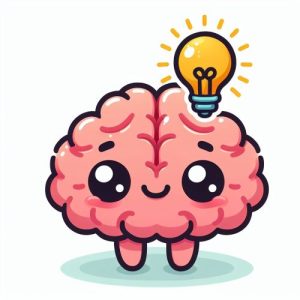1 Chapter One: Why Write?

Almost every college student in the country takes a class in writing. It’s a given. Why? Why is writing important? Do you just need to be able to write college papers and a résumé to get a job? Yes, but writing is much, much bigger than that. Writing is the major way humans communicate in the 21st century, more than in any other time in history. We write everywhere, all the time, across the globe.

Examine the word cloud above, a snapshot of the kinds of writing we do. Take a minute to think about how often you write in one day. Count everything: texts, memos, lists, notes in class, social media rants, emails to professors, online writing assignments, post-it-note for your roommate to complain about the cat box, dialogue blurbs for your comic book panel in the margins of your lecture notes. If you want something to last, you put it in writing.
In most careers today, writing is an important component. In fact, your writing is often the first impression you give. Much of the work in the world takes place in writing, such as in email communication, online collaboration, and in harnessing social media. Writing well and communicating clearly are foundational parts of being a professional and are some of the most crucial skills employers look for in any field. Even tech-giant companies realize that foundational skills (often called soft skills) like communication and teamwork are greater indicators of success than technical expertise.
According to a recent article in The Washington Post, “The seven top characteristics of success at Google are all soft skills: being a good coach; communicating and listening well; possessing insights into others (including others’ different values and points of view); having empathy toward and being supportive of one’s colleagues; being a good critical thinker and problem solver; and being able to make connections across complex ideas” (Strauss).
Google, like many companies, finds that workers who can think, communicate, and work with each other are more productive than employees who simply have hard skills (skills focused on completing a specific task). This goes for pretty much every job out there, from nurse to contractor to college president. Writing well will help you be better at any job you have.
Learning to write well not only helps you communicate, but it also helps you organize and think. To be able to answer an essay question in a geology class, you must be able to not only write well but understand the question, remember and select facts and examples appropriate to the question, and organize your ideas in a manner that best communicates your an swer. Writing is a reflection of your thinking, whether at school or at work. This is why you also want to think about how you are using Generative Artificial Intelligence (GAI) in your writing. Are you using it help you learn and grow as a writer?
swer. Writing is a reflection of your thinking, whether at school or at work. This is why you also want to think about how you are using Generative Artificial Intelligence (GAI) in your writing. Are you using it help you learn and grow as a writer?
Even in your personal life, writing is a powerful tool. Think about times you have received written comments that moved you, for good or bad: made you laugh, smile, cry, put butterflies in your stomach. Writing has the power to change people in surprising ways.
As you move through this text, think about the ways you will use writing skills in your academic life, your personal life, and your professional life. Writing well is a skill that will get you far in this modern world, but only if you practice honing your abilities.
Strauss, Valerie. “The Surprising Thing Google Learned about Its Employees — and What It Means for Today’s Students.” The Washington Post, 20 Dec. 2017.
Media Attributions
- Person writing at table © Designed by stories / Freepik
- word cloud chapter 1
- a cute, cartoon-like brain with a lightbulb above its head © Microsoft Copilot
